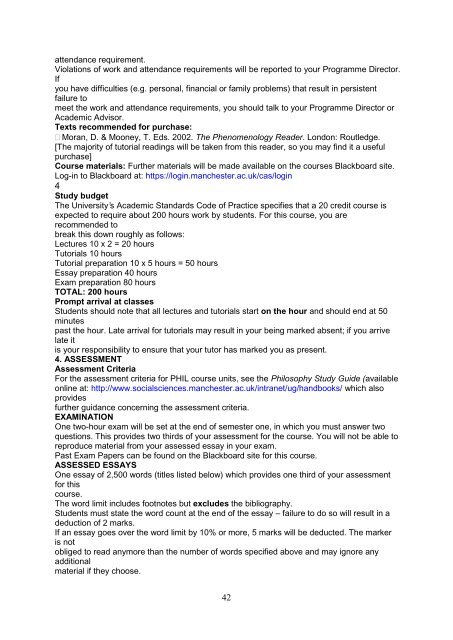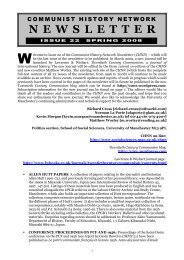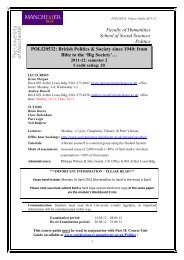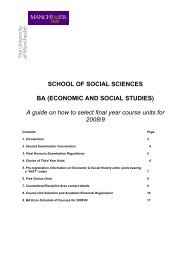second year course outlines 2012-2013 - School of Social Sciences ...
second year course outlines 2012-2013 - School of Social Sciences ...
second year course outlines 2012-2013 - School of Social Sciences ...
Create successful ePaper yourself
Turn your PDF publications into a flip-book with our unique Google optimized e-Paper software.
attendance requirement.<br />
Violations <strong>of</strong> work and attendance requirements will be reported to your Programme Director.<br />
If<br />
you have difficulties (e.g. personal, financial or family problems) that result in persistent<br />
failure to<br />
meet the work and attendance requirements, you should talk to your Programme Director or<br />
Academic Advisor.<br />
Texts recommended for purchase:<br />
Moran, D. & Mooney, T. Eds. 2002. The Phenomenology Reader. London: Routledge.<br />
[The majority <strong>of</strong> tutorial readings will be taken from this reader, so you may find it a useful<br />
purchase]<br />
Course materials: Further materials will be made available on the <strong>course</strong>s Blackboard site.<br />
Log-in to Blackboard at: https://login.manchester.ac.uk/cas/login<br />
4<br />
Study budget<br />
The University’s Academic Standards Code <strong>of</strong> Practice specifies that a 20 credit <strong>course</strong> is<br />
expected to require about 200 hours work by students. For this <strong>course</strong>, you are<br />
recommended to<br />
break this down roughly as follows:<br />
Lectures 10 x 2 = 20 hours<br />
Tutorials 10 hours<br />
Tutorial preparation 10 x 5 hours = 50 hours<br />
Essay preparation 40 hours<br />
Exam preparation 80 hours<br />
TOTAL: 200 hours<br />
Prompt arrival at classes<br />
Students should note that all lectures and tutorials start on the hour and should end at 50<br />
minutes<br />
past the hour. Late arrival for tutorials may result in your being marked absent; if you arrive<br />
late it<br />
is your responsibility to ensure that your tutor has marked you as present.<br />
4. ASSESSMENT<br />
Assessment Criteria<br />
For the assessment criteria for PHIL <strong>course</strong> units, see the Philosophy Study Guide (available<br />
online at: http://www.socialsciences.manchester.ac.uk/intranet/ug/handbooks/ which also<br />
provides<br />
further guidance concerning the assessment criteria.<br />
EXAMINATION<br />
One two-hour exam will be set at the end <strong>of</strong> semester one, in which you must answer two<br />
questions. This provides two thirds <strong>of</strong> your assessment for the <strong>course</strong>. You will not be able to<br />
reproduce material from your assessed essay in your exam.<br />
Past Exam Papers can be found on the Blackboard site for this <strong>course</strong>.<br />
ASSESSED ESSAYS<br />
One essay <strong>of</strong> 2,500 words (titles listed below) which provides one third <strong>of</strong> your assessment<br />
for this<br />
<strong>course</strong>.<br />
The word limit includes footnotes but excludes the bibliography.<br />
Students must state the word count at the end <strong>of</strong> the essay – failure to do so will result in a<br />
deduction <strong>of</strong> 2 marks.<br />
If an essay goes over the word limit by 10% or more, 5 marks will be deducted. The marker<br />
is not<br />
obliged to read anymore than the number <strong>of</strong> words specified above and may ignore any<br />
additional<br />
material if they choose.<br />
42

















